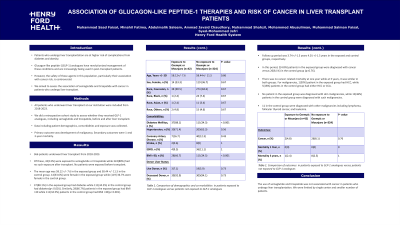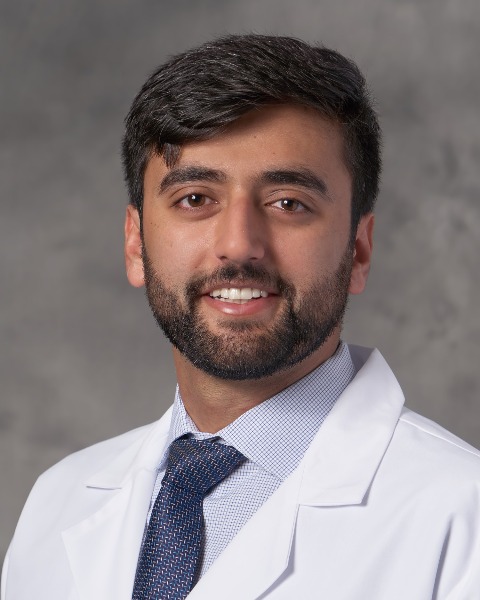Monday Poster Session
Category: Liver
P2959 - Association of Glucagon-Like Peptide-1 Therapies and Risk of Cancer in Liver Transplant Patients
Monday, October 28, 2024
10:30 AM - 4:00 PM ET
Location: Exhibit Hall E

Has Audio

Muhammad Saad Faisal, MD
Henry Ford Health
Detroit, MI
Presenting Author(s)
Muhammad Saad Faisal, MD1, Minahil Fatima, 2, Abdulmalik Saleem, MD1, Ammad Javaid. Chaudhary, MD1, Muhammad Shahzil, MD3, Mohammed Abusuliman, MD1, Muhammad Salman Faisal, MD1, Syed-Mohammed Jafri, MD1
1Henry Ford Health, Detroit, MI; 2King Edward Medical University, Lahore, Punjab, Pakistan; 3Penn State Health Milton S. Hershey Medical Center, Hershey, PA
Introduction: Patients who undergo liver transplantation are at higher risk of complications from diabetes and obesity. Glucagon-like peptide-1(GLP-1) analogues have revolutionized management of these conditions and are increasingly being used in post-transplant patients. However, the safety of these agents in this population, particularly their association with cancer risk, is controversial. We aimed to assess the association of semaglutide and tirzepatide with cancer in patients who undergo liver transplant.
Methods: All patients who underwent liver transplant at our institution were included from 2018-2023. We did a retrospective cohort study to assess whether they received GLP-1 analogues, including semaglutide and tirzepatide, before and after liver transplant. Data including patient demographics, comorbidities and exposure was collected. Primary outcome was development of malignancy. Secondary outcomes were 1-and 3-year mortality.
Results: 366 patients underwent liver transplant from 2018-2023. Of these, 42(13%) were exposed to semaglutide or tirzepatide while 324(88%) had no such exposure after transplant. No patients were exposed before transplant. The mean age was 58.12 +/- 7.6 in the exposed group and 58.44 +/- 11.5 in the control group. 14(33.6%) were female in the exposed group while (119) 36.7% were female in the control group. 37(88.1%) in the exposed group had diabetes while 111(34.2%) in the control group had diabetes(p< 0.001). Similarly, 28(66.7%) patients in the exposed group had BMI >30 while 111(34.5%) patients in the control group had BMI >30(p< 0.001). Follow up period was 3.74 +/-1.3 years 4.01 +/-1.5 years in the exposed and control groups respectively. In this period, 2(4.8%) patients in the exposed group were diagnosed with cancer versus 26(8.1%) in the control group (p=0.76). There was no cancer related mortality at one year while at 3 years, it was similar in both groups. For malignancies, 1(50%) patient in the exposed group had HCC, while 5(18%) patients in the control group had either HCC or CCA. No patient in the exposed group was diagnosed with skin malignancies, while 13(46%) patients in the control group were diagnosed with such malignancies. 11 in the control group were diagnosed with other malignancies including lymphoma, follicular thyroid cancer, and leukemia.
Discussion: The use of semaglutide and tirzepatide was not associated with cancer in patients who undergo liver transplantation. We were limited by single center and smaller number of patients.
Note: The table for this abstract can be viewed in the ePoster Gallery section of the ACG 2024 ePoster Site or in The American Journal of Gastroenterology's abstract supplement issue, both of which will be available starting October 27, 2024.
Disclosures:
Muhammad Saad Faisal, MD1, Minahil Fatima, 2, Abdulmalik Saleem, MD1, Ammad Javaid. Chaudhary, MD1, Muhammad Shahzil, MD3, Mohammed Abusuliman, MD1, Muhammad Salman Faisal, MD1, Syed-Mohammed Jafri, MD1. P2959 - Association of Glucagon-Like Peptide-1 Therapies and Risk of Cancer in Liver Transplant Patients, ACG 2024 Annual Scientific Meeting Abstracts. Philadelphia, PA: American College of Gastroenterology.
1Henry Ford Health, Detroit, MI; 2King Edward Medical University, Lahore, Punjab, Pakistan; 3Penn State Health Milton S. Hershey Medical Center, Hershey, PA
Introduction: Patients who undergo liver transplantation are at higher risk of complications from diabetes and obesity. Glucagon-like peptide-1(GLP-1) analogues have revolutionized management of these conditions and are increasingly being used in post-transplant patients. However, the safety of these agents in this population, particularly their association with cancer risk, is controversial. We aimed to assess the association of semaglutide and tirzepatide with cancer in patients who undergo liver transplant.
Methods: All patients who underwent liver transplant at our institution were included from 2018-2023. We did a retrospective cohort study to assess whether they received GLP-1 analogues, including semaglutide and tirzepatide, before and after liver transplant. Data including patient demographics, comorbidities and exposure was collected. Primary outcome was development of malignancy. Secondary outcomes were 1-and 3-year mortality.
Results: 366 patients underwent liver transplant from 2018-2023. Of these, 42(13%) were exposed to semaglutide or tirzepatide while 324(88%) had no such exposure after transplant. No patients were exposed before transplant. The mean age was 58.12 +/- 7.6 in the exposed group and 58.44 +/- 11.5 in the control group. 14(33.6%) were female in the exposed group while (119) 36.7% were female in the control group. 37(88.1%) in the exposed group had diabetes while 111(34.2%) in the control group had diabetes(p< 0.001). Similarly, 28(66.7%) patients in the exposed group had BMI >30 while 111(34.5%) patients in the control group had BMI >30(p< 0.001). Follow up period was 3.74 +/-1.3 years 4.01 +/-1.5 years in the exposed and control groups respectively. In this period, 2(4.8%) patients in the exposed group were diagnosed with cancer versus 26(8.1%) in the control group (p=0.76). There was no cancer related mortality at one year while at 3 years, it was similar in both groups. For malignancies, 1(50%) patient in the exposed group had HCC, while 5(18%) patients in the control group had either HCC or CCA. No patient in the exposed group was diagnosed with skin malignancies, while 13(46%) patients in the control group were diagnosed with such malignancies. 11 in the control group were diagnosed with other malignancies including lymphoma, follicular thyroid cancer, and leukemia.
Discussion: The use of semaglutide and tirzepatide was not associated with cancer in patients who undergo liver transplantation. We were limited by single center and smaller number of patients.
Note: The table for this abstract can be viewed in the ePoster Gallery section of the ACG 2024 ePoster Site or in The American Journal of Gastroenterology's abstract supplement issue, both of which will be available starting October 27, 2024.
Disclosures:
Muhammad Saad Faisal indicated no relevant financial relationships.
Minahil Fatima indicated no relevant financial relationships.
Abdulmalik Saleem indicated no relevant financial relationships.
Ammad Chaudhary indicated no relevant financial relationships.
Muhammad Shahzil indicated no relevant financial relationships.
Mohammed Abusuliman indicated no relevant financial relationships.
Muhammad Salman Faisal indicated no relevant financial relationships.
Syed-Mohammed Jafri: Gilead, Takeda, Abbvie, Intercept, VectivBio – Advisor or Review Panel Member, Speakers Bureau.
Muhammad Saad Faisal, MD1, Minahil Fatima, 2, Abdulmalik Saleem, MD1, Ammad Javaid. Chaudhary, MD1, Muhammad Shahzil, MD3, Mohammed Abusuliman, MD1, Muhammad Salman Faisal, MD1, Syed-Mohammed Jafri, MD1. P2959 - Association of Glucagon-Like Peptide-1 Therapies and Risk of Cancer in Liver Transplant Patients, ACG 2024 Annual Scientific Meeting Abstracts. Philadelphia, PA: American College of Gastroenterology.
